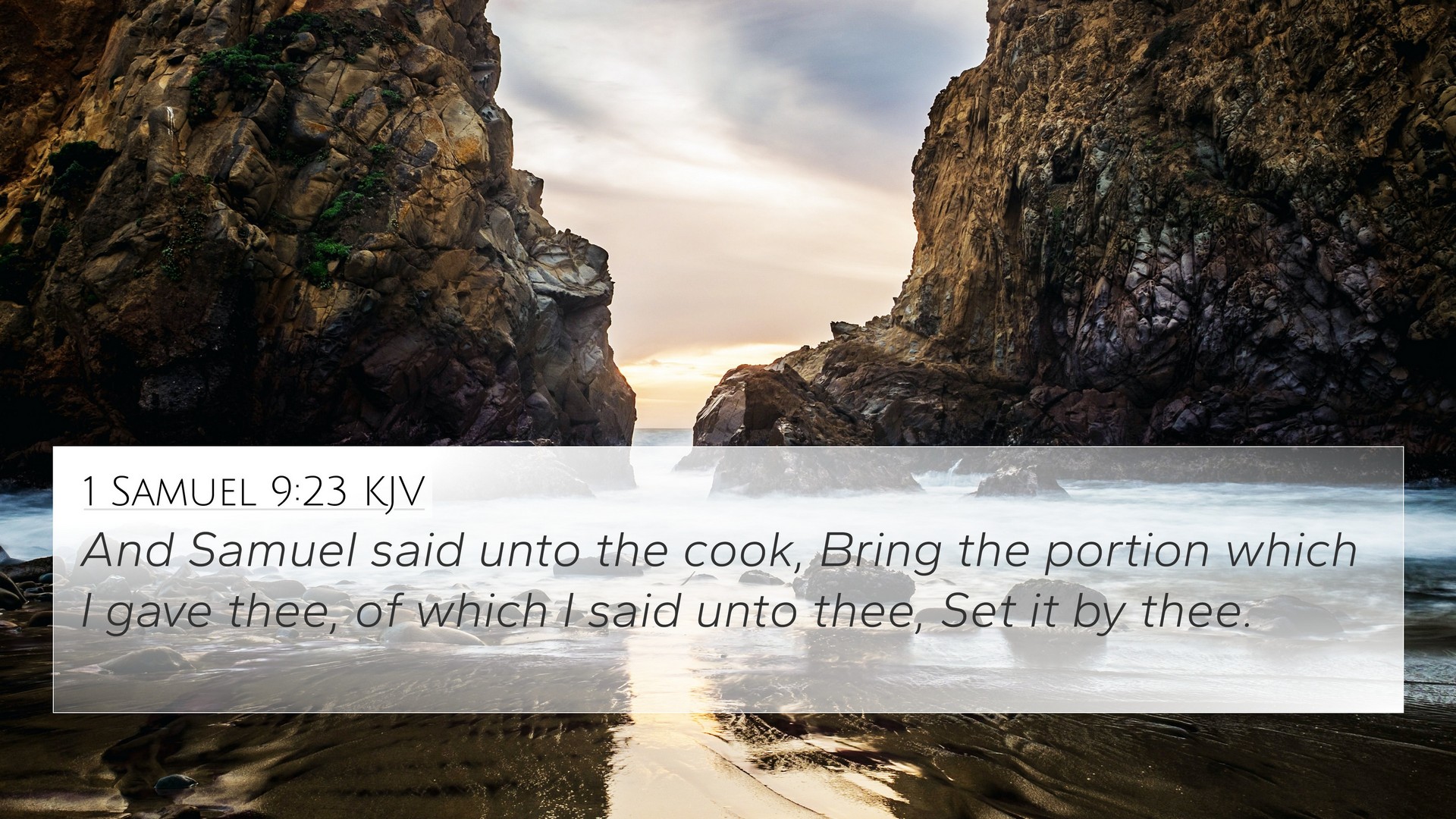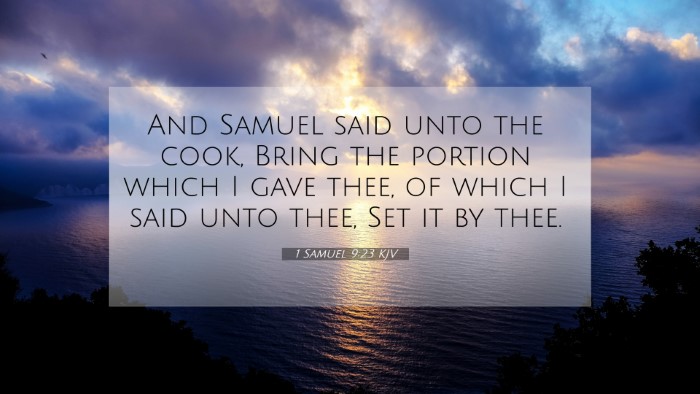Bible Verse: 1 Samuel 9:23
1 Samuel 9:23 states, "And Samuel said unto the cook, Bring the portion which I gave thee, of which I said unto thee, Set it by thee."
This verse occurs in a significant moment in the narrative leading up to Saul's anointing as king of Israel. The verse narrates Samuel instructing the cook to bring out a special portion of food that had been set aside for Saul. Understanding this verse requires consideration of its larger context and its implications for the leadership of Israel.
Meaning and Interpretation
The instructions given by Samuel not only highlight the importance of the meal but also symbolize the divine selection of Saul. Through the perspective provided by public domain commentaries such as those by Matthew Henry, Albert Barnes, and Adam Clarke, we can draw several insights:
-
Divine Providence: This moment showcases God's providence and design in establishing Saul as the king. Samuel’s actions reflect his obedience to God’s directive in appointing Saul to leadership.
-
Symbolism of the Meal: The portion of meat that Samuel mentions symbolizes the significant calling and anointing of Saul. It is not merely a meal but an indication of the blessings and responsibilities that come with leadership.
-
Preparation for Leadership: Samuel’s careful planning in preparing this meal for Saul signifies the seriousness of Saul's forthcoming role. Leaders are prepared through divine appointments and symbols that mark their calling.
Connections Between Bible Verses
This verse can be cross-referenced with several other scriptures that elaborate on themes of leadership and divine appointment. Here are some suggested connections:
- 1 Samuel 10:1 - Samuel anoints Saul, reinforcing the significance of his preparation in this verse.
- 1 Samuel 15:1 - Samuel delivers God’s message to Saul, emphasizing the Lord’s expectations of his leadership.
- 2 Samuel 2:4 - The anointing of David, reflecting on God’s continued guidance in Israel’s leadership.
- 1 Chronicles 10:1-14 - The account of Saul’s downfall relates to the responsibilities he bore as king.
- Romans 13:1 - Paul discusses the idea of God’s sovereignty in establishing authority, paralleling the divine appointment seen in Samuel’s actions.
- Acts 10:9-16 - Peter’s vision and the instruction about clean and unclean foods align with God's providential preparation throughout scripture.
- 1 Peter 5:2-4 - A New Testament exhortation on shepherding God’s flock reflects back on the responsibility of leaders like Saul.
Thematic Bible Verse Connections
The themes found in 1 Samuel 9:23 are echoed throughout the Bible, particularly regarding leadership and God’s chosen instruments. Here are some thematic connections:
-
God's Selection of Leaders: Across the scriptures, there are many instances where God selects leaders for His people, including Moses (Exodus 3), David (1 Samuel 16), and Jesus (Matthew 4).
-
The Role of Prophets: Samuel serves as God's prophet, reflecting the continuous role prophets play in guiding and anointing leaders, as shown in books like Jeremiah and Ezekiel.
-
Divine Guidance: The necessity of seeking God's guidance for leadership is underscored throughout Proverbs (Proverbs 3:5-6) and echoed in the New Testament (James 1:5).
-
Consequences of Leadership: Leaders are often held to a higher standard, as seen in the judgments of kings in 1 and 2 Kings.
Practical Applications
Understanding 1 Samuel 9:23 can provide valuable insights into the nature of leadership and divine orchestration in our lives:
-
Recognizing Divine Appointments: Being aware of divine moments that can set the course for our lives and the importance of preparation for such times.
-
Understanding Responsibilities: Leaders must be reminded of the weight their roles carry and the accountability they have before God.
-
Importance of Guidance: The need for seeking guidance and prayer when making decisions, reflecting Samuel's example of preparation.
Conclusion
In summary, 1 Samuel 9:23 encapsulates a critical moment in the transition of leadership in Israel, designed by divine intent. By exploring this verse through cross-referencing with other scriptures, we glean insights not only into God’s selection process but also the responsibilities that accompany such appointments. For those interested in deeper understanding, utilizing tools for Bible cross-referencing will enhance one’s study of biblical themes and connections.




